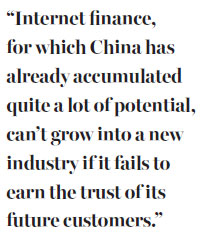Progress must not pummel public
Updated: 2016-09-09 07:45
By Ed Zhang(China Daily Europe)
|
|||||||||
While e-commerce and e-finance are shining stars, their growth will be stifled if people remain vulnerable to e-fraudsters
People often describe China in the "on the one hand ... and on the other " structure, because it readily applies to many situations.
You may say, on the one hand, that the country has produced some of the largest, if not most capable, internet services, while it is, on the other, plagued by some of the worst internet telecom swindles.
Some recent cases even directly led to victims' deaths. They were literally heartbreaking deaths in which young people from poor, distant areas were cheated out of the biggest amount of money they had ever held in their lifetime, their family savings for them to go to college.
Such is the price of development, some economists may explain. It is inevitable that in a process of rapid economic change, mismatches and even sharp contradictions abound. But the cold reality is that before resolving the irony, at least making the offense less devastating, the whole internet industry really can't go very far.

Internet finance, for which China has already accumulated quite a lot of potential, can't grow into a new industry if it fails to earn the trust of its future customers.
The spillover effect of a growing industry on the overall job market is huge, as one can tell from the swelling fleet of electric delivery mopeds for e-commerce orders in Chinese cities.
They run in the millions. Along with warehouses operated by busy workers, they have been a great help for the nation in accommodating its low- to mid-skilled labor now that many assembly lines are being relocated to other countries.
E-commerce has been the pride of China. But, on the other hand, its growth would be stunted and badly deformed without the rule of law and due enforcement. It must figure out effective solutions to deal with the e-fraudsters, many of them operating from overseas, taking advantage of different loopholes in different justice systems.
In today's market conditions, if e-payments, e-transfers and e-finance acquire the ability to reach millions of people instantly in different parts of the world, customers' daily losses could run into the billions of yuan. Customer protection would be just empty talk if crime flourishes in a highly globalized network environment while justice and law enforcement keep operating in an archaic, fragmentary style.
Where is the leadership in addressing this situation? This is a question that China must be asking seriously. In a time of rising protectionism even in physical goods and traditional trade, it seems nowhere are politicians ready to create for their constituencies future internet-based opportunities. In many cases, they don't even seem to have knowledge about the forces driving the change.
Can China be a leader? It should try to be one if it wants its internet business to continue to grow. From the just-finished G20 Summit in Hangzhou, in East China, top Chinese officials and business executives showed their willingness to work in this direction, such as by building a world-level e-market platform, based on the country's experience in operating the world's largest single-nation e-market.

But it must be pointed out that to do so, China must work with other countries and leaders in other industries extensively. A serious, if not fatal, drawback for China is the trustworthiness of its state-dominated banking industry. It is a hotbed of rampant identity theft and e-fraud perpetrated on its customers.
At the same time, its telecommunications industry, also state-dominated, provides easy ways for e-fraudsters to reach their targets.
Sometimes, government offices, such as the education authority, are suspected of being the source of identity leaks through their careless handling of student information.
There also are companies to blame outside the state sector. Some Chinese search engines and tech companies have done a disastrous job in protecting private identities and in preventing advertising by illicit services.
All this, in combination with the still vague definition of the right of privacy and identity-based responsibility in the Chinese legal system, may be an important barrier for the nation to overcome in its efforts to build its internet into a respected service in the world.
To start with, heavy penalties for identity leaks and theft, and a crackdown on e-frauds - as ruthless as that on narcotics traffic - should become a daily reality.
Companies, state-owned or not, should be provided with incentives for their verifiable efforts in developing ways to boost identity protection and security for credit-based services.
On the above to-do list, no item is technically impossible. But the most important thing to do, as President Xi Jinping said, is to take action, not to keep talking.
The author is an editor-at-large of China Daily. Contact the writer at edzhang@chinadaily.com.cn
(China Daily European Weekly 09/09/2016 page11)
Today's Top News
No 'running commentary' on Brexit negotiations: PM
Girl earns $64,100 helping Chinese name their babies
Apple unveils iPhone 7, Pokemon Go coming to watch
Next step:Global action on growth
Greenland starts on UK's tallest residential building
Chinese women find their way through glass ceiling
China, UK vow to push 'golden-era' ties forward
MPs to debate second Brexit referendum petition
Hot Topics
Lunar probe , China growth forecasts, Emission rules get tougher, China seen through 'colored lens', International board,
Editor's Picks

|

|

|

|

|

|







